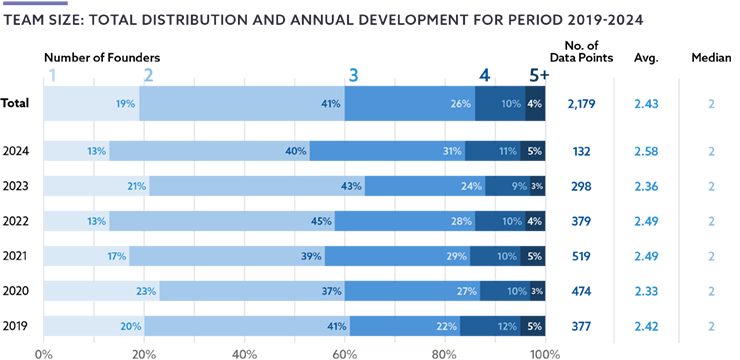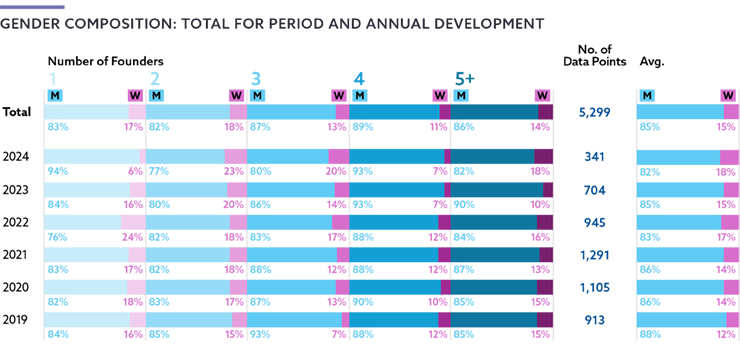#FounderTeams in German Start-ups – Part I: Team Size and Gender Distribution | Legal Ninja Snapshots
Legal Ninja Snapshots
4 minute read | June.17.2025
Prefer to listen?
Enjoy this text-to-speech recording of this article:
We are excited to share the initial findings from our comprehensive Founder Equity Study 2025.
About the Study
Our research analyzed founder teams and equity distributions across almost 2,200 German start-ups established between 2019 and 2024, each having secured external funding through angel investors or (corporate) venture capital. While our dataset focuses on funded start-ups rather than the entire German start-up ecosystem, it provides valuable insights into team composition, gender distribution, and equity allocation patterns. The analysis tracks developments over multiple years and offers both aggregate and sector-specific perspectives.
OLNS#15
The complete findings will be published in the fifteenth edition of the Orrick Legal Ninja Series (OLNS#15). This comprehensive report will include:
- Detailed data analysis and sector-specific breakdowns
- Comparative analysis with US start-up ecosystem data
- Practical guidance on team composition and equity allocation
- Insights on managing team dynamics and founder transitions
- Expert interviews with leading venture capital investors sharing their perspectives on these crucial founding decisions
This Legal Ninja Snapshot Series
In this two-part mini-series, we present key findings on:
Team Size
Let us first look at the distribution of team sizes across the entire data set and how it developed over the years.
The overall data set shows that two-founder teams dominate (41%) followed by three-founder teams (26%) and solo founders (19%). Spoiler alert (more on that in OLNS#15): several sectors display notable deviations from these aggregate patterns.

The aggregate data shows remarkable stability in team composition over the six-year period. The average team size has remained consistently between 2.33 and 2.58 founders, with two-founder teams maintaining their dominant position (ranging from 37% to 45% of all start-ups) throughout the period.
However, some notable variations emerge:
- Solo founders showed significant fluctuation, ranging from a low of 13% (2022, 2024) to a peak of 23% (2020). One could speculate that the higher number of solo founders in 2020 and 2021 are driven largely by the COVID-19 pandemic rather than an overall trend to more solo founders receiving funding.
- The proportion of three-founder teams has shown slight growth in recent years, particularly in 2024 (31% compared to 22% in 2019).
Gender Distribution
We also analyzed the total gender distribution as well as the temporal distribution patterns from 2019-2024, looking at both the overall dataset and sector-specific trends (again, for the sector-specific deep dive we refer you to OLNS#15). A statistical note is in order: The analysis of recent years (2023-2024) and certain sectors should be interpreted with caution due to smaller sample sizes. Additionally, our dataset's focus on VC-backed companies might not fully represent the broader start-up ecosystem's gender dynamics.
Our data set included a total of 5,299 founders and our preliminary analysis confirms and quantifies the significant underrepresentation of women in German start-ups. We found an overall woman representation of only 15%.
This disparity not only persists but often widens with increasing team sizes. While some sectors show more promising numbers, the overall picture suggests that substantial work remains to achieve better gender balance across all sectors and team sizes. However, as we will see in the analysis of the annual developments there are a few encouraging signs.

Our data shows a gradual, though modest, improvement in woman representation over the analyzed period. While man founders remained dominant throughout, the proportion of woman founders increased from 12% in 2019 to 18% in 2024 across all team sizes.
While there is a general trend toward increased woman representation, the development varies significantly across different team configurations and years.
- Solo founders show significant fluctuation in woman representation, ranging from 6% (2024) to 24% (2022).
- The proportion of woman founders in two-founder teams, the most common configuration, improved from 15% in 2019 to 23% in 2024. This steady increase might suggest that two-founder teams offer particularly favorable conditions for mixed-gender founding constellations but this will certainly require further research.
- The gender distribution in three-founder teams shows a less clear pattern. While there is an overall improvement from 2019 to 2024, the year-to-year fluctuations suggest that other factors might influence gender composition in these larger teams.
- Larger teams (4+ founders) consistently show lower woman representation throughout the period. The persistent gender gap in larger teams might reflect additional barriers for woman participation in more complex founding constellations, though our data cannot establish the specific causes for this pattern.